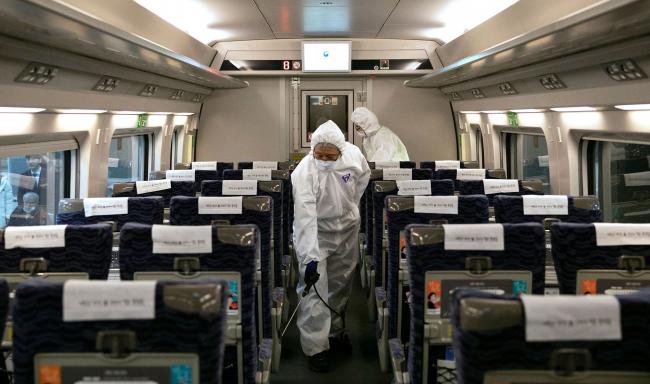(Bloomberg) -- Investor anxiety that’s swept the globe over the coronavirus extended to Canadian stocks and the loonie after a second person in Toronto tested positive for the illness.
Volatility on the S&P/TSX Composite Index spiked as stocks posted their biggest drop since October, joining a world-wide equity rout. The loonie weakened against the greenback and Canada’s two-year and 10-year bonds rallied for a fifth straight day.
With two infected patients in Canada’s most populous city, concern is rising about the speed with which the virus has spread beyond China. Its similarity to severe acute respiratory syndrome (SARS) -- a disease that killed 44 in Canada, the highest number of deaths outside of Asia -- has both heightened fears and served as a reminder that the country is in a much better position to deal with a pandemic than it was 17 years ago.
“Panic is the biggest risk,” said Rebekah Young, an economist at Bank of Nova Scotia, by phone. “When you actually look back at SARS where Canada was an epicenter, the overall economic impact was negligible. It was a very-short lived impact and in a big picture, not that bad.”
For the nation’s stock market, it’s a tale of two moves: gold miners surged Monday as investors piled into haven assets, while industrial metal miners slumped as the price of copper and iron ore sank on concerns that global growth could slow. Teck Resources Ltd. dropped for a third day, to its lowest since July 2016.
Air Canada slipped for a fifth day, taking its plunge to about 12% over that stretch, the biggest drop since June 2016. The airline reported quarterly losses during the 2002-2003 SARS epidemic as travelers avoided Toronto.
- Canada Goose Holdings Inc. fell 4% and Gildan Activewear Inc. slipped 2%. Both clothing companies could see a decline in earnings.
- Ballard Power Systems Inc., the fuel-cell manufacturer that gets more than 30% of its revenue from China, fell as much as 9%
- Imax Corp., a Mississauga, Ontario-based company listed in the U.S. that gets more than 30% of its revenue from China, extended last week’s drop, for a six-day decline of about 15%.
Read more: Spread of Chinese Virus Would Test Canada’s Economic Resilience
Economists at Scotiabank estimate that a similar outbreak to the 2003 SARS epidemic could dent the economy by just over 0.1% on the level of GDP by mid-2020.
While trader jitters seep into market sentiment, some are saying buy the dip. Jefferies industrials research team said in a report that the knee-jerk reaction within the metals and mining sectors could be an opportunity to pick up stocks amid the sell-off. During the spread of SARS, the initial reaction was sharply negative for metals and mining equities but the sector rebounded sharply afterwards, which could be the case for coronavirus, the analysts said.
Canada Virus Update
The wife of the man who was identified as Canada’s first confirmed case was infected by the virus, Ontario Chief Medical Officer of Health David Williams (NYSE:WMB) said in a statement Monday. She has been in self-isolation since arriving in Canada’s largest city with her husband last week.
Over the weekend, Williams (NYSE:WMB) confirmed that the woman’s husband -- a man in his 50s -- had tested positive for the SARS-like illness. The man, who had traveled from Wuhan, China via Guangzhou, arrived in Toronto on Jan. 22 and went to Sunnybrook hospital the following day after feeling ill. The patient is in stable condition, officials said Saturday.
Officials will be contacting flight passengers who were within 2 meters of the patient aboard the flight from Guangzhou to Toronto. Minister of Health Patty Hajdu spoke to reporters in a press briefing Sunday to reiterate the risk to Canadians still remains low.
“While the risk of an outbreak of novel coronavirus in Canada remains low, I encourage Canadians to tell your health-care professional if you’ve traveled to an affected area of China and develop flu-like symptoms,” Hajdu said from Ottawa.
On Jan. 23, the World Health Organization stopped short of calling coronavirus a global health emergency, saying it remains a local crisis confined to China. However, with millions of people set to travel over the Chinese New Year, other nations are taking their own steps to slow the spread of the disease.
There are 2,804 confirmed cases worldwide and at least 80 deaths as of Jan. 27.
